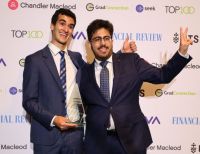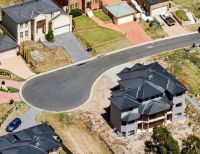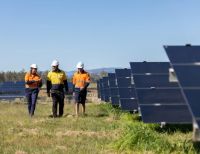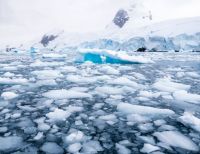Scientia Professor Helen Christensen has received the James Cook Medal, with academics from Medicine & Health, Science and UNSW Canberra recognised with awards for research and scholarly excellence.
Scientia Professor Helen Christensen received the James Cook Medal for her outstanding work that uses technology to deliver evidence-based interventions for the prevention and treatment of depression, anxiety, suicide, and self-harm. Photo: UNSW Sydney
Six UNSW researchers and professional staff have been recognised at the 2023 Royal Society of NSW Awards. Scientia Professor Helen Christensen has been awarded the James Cook Medal, which is the Society’s highest honour. Professor Maria Kavallaris, Scientia Professor Kaarin Anstey, Dr Brendon Neuen, Professor Moninya Roughan and Mr Jason Antony have also received awards.
Overall, eight awards and medals, three scholarships and two service awards were announced for 2023 by the Royal Society of NSW at the 1318th Ordinary General Meeting, held at the State Library in NSW Wednesday night. The Open Lecture was delivered by UNSW Professor John Church, winner of the Society’s 2022 James Cook Medal.
Interim Dean of UNSW Medicine & Health Professor Adrienne Torda applauded the UNSW winners on their success.
"I congratulate these extraordinary UNSW researchers for being recognised at the Royal Society of New South Wales Awards. Special congratulations to Helen Christensen for receiving the James Cook Medal. Helen is a truly deserving recipient – as one of Australia’s leading mental health experts, she has made significant contributions to being able to identify and treat sufferers of this chronic disease through innovative digital treatments,” Prof. Torda said.
“All our winners are exceptional specialists in their fields. The annual Royal Society of NSW awards are among the oldest and most prestigious awards in Australia, and it’s an honour for so many of our scientists to be recognised.”
James Cook Medal
UNSW Scientia Professor Helen Christensen, Board Director of the Black Dog Institute, has been awarded the James Cook Medal for outstanding contributions to science and human welfare in the Southern Hemisphere. It’s the most prestigious award offered by the Royal Society of NSW.
Prof. Christensen is a leading expert on using technology to deliver evidence-based interventions for the prevention and treatment of depression, anxiety, suicide, and self-harm.
“I'm very honoured to receive this prestigious medal. The work I do, alongside my colleagues, is all about making life better for those in our community facing mental health struggles. The Royal Society’s award recognises that using science is one of the best ways to solve the tough problems we're dealing with today,” Prof. Christensen said.
UNSW researchers have received the James Cook Medal nine of the last 10 times the medal has been awarded.
Clarke Medal
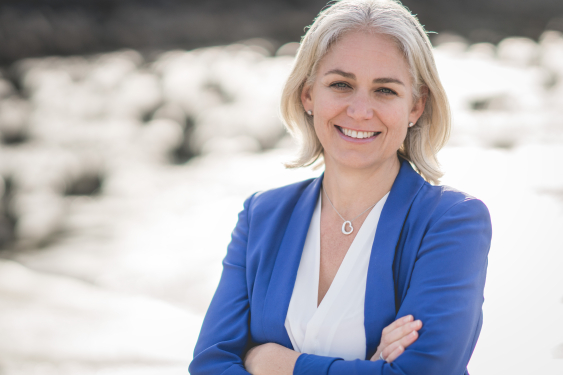
Professor Moninya Roughan. Photo: UNSW.
Professor Moninya Roughan from UNSW Science has been awarded the Clarke Medal for distinguished research in the natural sciences, conducted in Australia and its territories, in the fields of botany, zoology, and geology.
Prof. Roughan is an authority on the dynamics of the East Australian Current, ocean observation and prediction systems and their application to understanding western boundary currents and continental shelf processes. She leads the Coastal and Regional Oceanography Lab at UNSW.
“I am truly humbled and deeply grateful to be the recipient of this prestigious award. This recognition is not just a reflection of my individual efforts but a testament to the collaborative spirit of the scientific community and every breakthrough stands on the shoulders of those who came before me. I am fortunate to have been guided by mentors, inspired by colleagues, and supported by my dedicated research team at UNSW,” Prof. Roughan said.
"I believe that the truest achievement is in the positive impact my research has on the world and I hope that this recognition inspires future generations to explore the limitless possibilities in the ocean sciences and foster environmental stewardship."
Walter Burfitt Award
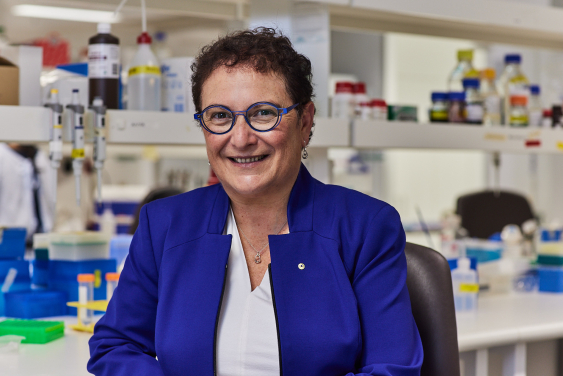
Professor Maria Kavallaris. Photo: UNSW.
Professor Maria Kavallaris from UNSW Medicine & Health received the Walter Burfitt Award, for distinguished research in any area of the Medical and Veterinary Sciences and Technologies.
Prof. Kavallaris leads the Tumour Biology and Targeting Group at the Children’s Cancer Institute and is the founding co-director of the Australian Centre for NanoMedicine at UNSW. She has made seminal contributions to understanding the role of the cytoskeleton in cancer biology and is best known for identifying how tumour cells become resistant to commonly used chemotherapy drugs and how drug resistance can be reversed.
Her studies have identified how some tumours can grow and spread in the body, and she has applied this knowledge towards the development of advanced diagnostics and therapeutics using nanotechnology.
“I've dedicated my life to understanding and identifying effective treatments for cancer because I believe that everyone deserves a chance to survive. This award is a reminder that our work is making a difference, and it inspires me to continue pushing forward. This award is not just for me; it's for all the past and present brilliant students and researchers who I have had the honour of mentoring and working with,” Prof. Kavallaris said.
Award in the Social and Behavioural Sciences
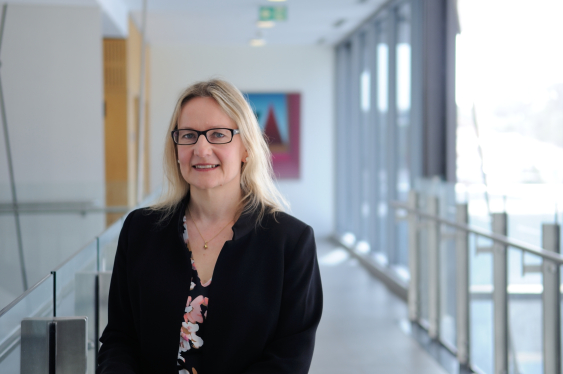
Scientia Professor Kaarin Anstey. Photo: UNSW.
Scientia Professor Kaarin Anstey from UNSW Science has received the inaugural Award in the Social and Behavioural Sciences, which is for distinguished research in any area of the social and behavioural sciences including psychology, economics, management, and related disciplines.
Prof. Anstey’s research programs focus on cognitive resilience in ageing as well as prevention of dementia. She has developed new methods to assess risk of cognitive decline and dementia as well as non-pharmacological interventions to reduce these risks. Another focus of her work is on older driver safety and in this field, she has also developed and validated risk assessment tools and interventions.
“I am excited and honoured to receive this inaugural award from the Royal Society of NSW and would like to thank my colleagues and team with whom I’ve worked for many years,” Prof. Anstey said.
“Cognitive health is central to ageing well and I look forward to continuing to expand our knowledge in this field.”
Ida Browne Early Career Medal
Dr Brendon Neuen from the George Institute of Global Health – an affiliate of UNSW – has been awarded the inaugural Ida Browne Early Career Medal. The Medal is awarded for contributions to knowledge and society in Australia or its territories by an individual from 0–5 years post-PhD or equivalent.
Dr Neuen is a nephrologist and Director of the Kidney Trials Unit at Royal North Shore Hospital. He is recognised for his expertise in cardio-renal-metabolic medicine. His work has directly informed more than 25 major international and national guidelines, position papers and scientific statements about optimal care for people with type 2 diabetes and kidney disease.
“I am delighted and honoured to be the inaugural recipient of the Ida Browne Medal from the Royal Society of NSW. My work would not be possible without the generosity of patients and the dedication of study teams and investigators who made large-scale international clinical trials a reality,” Dr Neuen said.
“I feel a deep sense of responsibility to ensure that this recognition is translated into a long and impactful career in clinical trials that improves the lives of people with type 2 diabetes and kidney disease worldwide."
Royal Society of NSW Citation
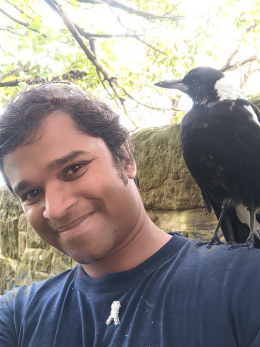
Jason Antony. Photo: UNSW
Mr Jason Antony from the Industrial Relations Research Group at UNSW Canberra has received the Royal Society of New South Wales Citation, for significant contributions to the Society.
Since 2016, Mr Antony has been indispensable in the production of fifteen issues of the Journal & Proceedings of the Royal Society, and as editor and producer, of 28 issues of the Bulletin from 2020 to 2023.
“Helping produce the Royal Society’s Journal & Proceedings and Bulletin is a rewarding and enriching experience,” Mr Antony said.
“When a venerable institution recognises one's contributions formally, it fills life with vim, vigour, and a renewed sense of purpose. I am immensely grateful to the Society, and to the myriad of wise, wonderful people who have provided guidance and nurtured my skills over the years.”
Read more about the Royal Society of NSW Awards 2023.









